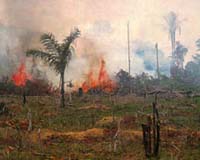| . |  |
. |
Lima (UPI) Jun 15, 2009 Facing crisis after dozens of people were killed in clashes, Peru's Congress has suspended for three months plans to open large swathes of the Peruvian Amazon to foreign investment. The move was made as public support for indigenous groups widens. Last Friday riot police broke up demonstrations in the capital Lima, and the government imposed a curfew on several towns in the Amazonian region. A general strike last Thursday drew thousands of protestors to Peru's Amazonian city of Iquitos in the north and in cities and towns elsewhere in the country. Protesters have condemned right-wing President Alan Garcia's policies to lure foreign investment while ignoring, they say, the native Peruvians in the Amazon. Opposition to Garcia's schemes was reignited by clashes between police and native people in Bagua province on June 5 that left dozens dead, including 23 police officers. The deadly violence broke out when police moved in with automatic weapons and tear gas to remove protesters who were blocking a highway and oil pumping station. Although most protesters had spears, bows and arrows, some had guns. Three days later one Cabinet minister, Women's Issues and Social Development Minister Carmen Vildoso, resigned to protest the heavy-handed response. There is also growing pressure for the resignation of two other Cabinet ministers. But the two, Cabinet Chief Yehude Simon and Interior Minister Mercedes Cabanillas -- who is expected to be Garcia's choice for chief of staff in July -- said they have no intention of resigning. The president has claimed there is "a conspiracy afoot to keep Peru from using its natural riches." In a speech Garcia said the protesters were "ignorant," and he hinted that the left-wing governments of Bolivia and Venezuela were supporting and financing the protests. He called on Peruvians to support his government and the modernization process he said was under way. Meanwhile, Alberto Pizango, the leader of the indigenous groups' umbrella organization, has requested political asylum at the Nicaraguan Embassy in Lima after a warrant was issued for his arrest. The rainforest protests began in August 2008 when the Garcia administration overstepped its bounds -- according to Peru's Congress -- by passing dozens of decrees to implement a free-trade agreement with the United States. The indigenous communities objected to a number of decrees that dealt with land and water rights, arguing that it would lead to the sale of their ancestral lands as well as increase the number of logging and oil concessions on Amazonian lands. But Congress failed to follow up on the repeals it promised, and so protests resumed in April. By late April indigenous demonstrators, led by AIDESEP, which represents most of Peru's 50 indigenous groups, were blocking roads and rivers and managed to force the state oil company to close its northern oil pipeline. Shortly afterward a number of oil fields were forced to close. The growing protests are particularly disruptive for the Garcia administration, which planned to invest $1 billion in oil exploration this year. Peru is undergoing a commodities-led boom, and the government claims that some 6 billion barrels of oil are waiting to be exploited under the Amazon.
Share This Article With Planet Earth
Related Links Forestry News - Global and Local News, Science and Application
 Amazon deforestation: short-lived boost, big damage
Amazon deforestation: short-lived boost, big damageWashington (AFP) June 12, 2009 Clearing the Amazon rainforest for soy or cattle does not bring long-term social or economic benefit to local communities and threatens the environment, according to a study published Friday. Huge swaths of the Brazilian rainforest are cut down, burnt or cleared each year, at an average rate of 1.8 million hectares (4.4 million acres) - about the size of Kuwait - because the land is worth ... read more |
|
| The content herein, unless otherwise known to be public domain, are Copyright 1995-2009 - SpaceDaily. AFP and UPI Wire Stories are copyright Agence France-Presse and United Press International. ESA Portal Reports are copyright European Space Agency. All NASA sourced material is public domain. Additional copyrights may apply in whole or part to other bona fide parties. Advertising does not imply endorsement,agreement or approval of any opinions, statements or information provided by SpaceDaily on any Web page published or hosted by SpaceDaily. Privacy Statement |